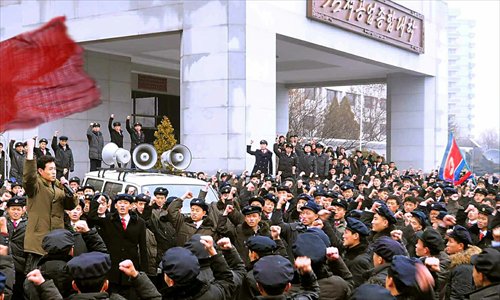Kim Jong-un regime has strong hold on power after leadership reshuffle

Students at the Kim Chaek University of Technology in Pyongyang rally on Wednesday vowing to protect North Korean leader Kim Jong-un with their lives. Photo: IC
The high-profile purge of Jang Song-thaek, widely reported to be the second in command in North Korea, shows that Kim Jong-un is now in tighter control of his country's military and security organs, and that his power base has been further consolidated.
During the early months after the younger Kim took power following his father Kim Jong-il's sudden and premature death on December 17, 2011, he was seen surrounded by a trio of advisors, namely Jang Song-thaek (Kim's uncle-in-law), Kim Kyong-hui (Jong-un's aunt and Jang's wife), as well as Ri Yong-ho, vice chairman of the Central Military Commission of the Workers' Party of Korea (WPK) since 2009.
It was assumed the trio would be regents that could help the politically inexperienced Kim run the country.
However, less than two years after the younger Kim came to power, the trio was gone, with Ri, 71, being relieved on July 15, 2012 of all of his posts "because of illness," then Jang ousted early this month. And Kim Kyong-hui was given no actual power except for being promoted to the rank of full (four-star) general after having spent most of her life as the top manager of North Korea's light industry.
North Korea watchers worldwide like to refer to a picture showing Kim Jong-un and another seven top North Korean officials walking alongside the hearse during the state funeral for Kim Jong-il on December 28, 2011.
The "Great Eight" were regarded as the core of the North Korea's third generation of leadership, at least at the time the picture was taken.
But now four of them (including Jang and Ri) have disappeared from North Korea's political picture, with only Kim Ki-nam (84), Choe Tae-bok (83) and Kim Yong-chun (77) still holding their various high-ranking WPK and state posts.
If their ages are taken into consideration, they can only carry out their duties in a ceremonial way.
If political analysts are right in saying this was only the beginning of "a series of purges," the next high-ranking victim might be from the military, because Jang was not a real military strongman although he had held the title of vice chairman of the all-powerful National Defense Commission since 2010 (Kim Jong-un himself is the chairman).
The "Report on Enlarged Meeting of Political Bureau of Central Committee of WPK" released on Monday by the Korean Central News Agency (KCNA) lists a variety of crimes, including "anti-party, counter-revolutionary factional acts," among others, allegedly committed by Jang and his protégés.
Claims that Jang's disgrace was the result of his attempt to challenge Kim Jong-un's authority were not convincing, despite Jang's reported disagreement with Kim over economic policies.
The KCNA report said "Jang seriously obstructed the nation's economic affairs and the improvement of the standard of people's living in violation of the pivot-to-the-cabinet principle and the cabinet responsibility principle laid down by the WPK."
One plausible explanation for the sudden ousting is that one of Jang's top aides reportedly defected at the end of September or early October, offering Kim the opportunity he much needed.
It was Kim himself who initiated the purge to further consolidate his power base. Supporting evidence includes the rare release of pictures showing Jang being taken away from his seat during a large gathering of the elite, with participants staring with great awe and fear, as well as a new song released on Monday afternoon, the lyrics of which depict absolute loyalty to Kim. The crimes Jang allegedly committed, such as corruption and womanizing, could be applied to anyone in that conference hall. Potential dissidents will now have second thoughts before any action is taken.
The die has been cast in terms of Kim's plans for the immediate future of North Korea's leadership, and regardless of whether there are further purges, Kim is now in firm control of the country. Despite the shock wave of the purge caused to its officials and populace, North Korea will remain stable politically for a long while.
The ousting of Jang will not shake up the regional situation in a general sense, but countries in the region perhaps should prepare themselves for the possibility of another round of brinkmanship.
The author is deputy managing editor of the Global Times. chenping@globaltimes.com.cn